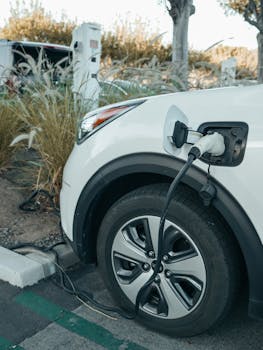The automotive industry is undergoing a significant transformation due to the integration of digital tools. These advancements are reshaping how vehicles are manufactured, sold, and maintained. Digital tools enhance efficiency, improve safety, and elevate the overall customer experience.
From advanced manufacturing technologies to connected car systems, digital tools have revolutionized how automotive companies operate. These innovations foster collaboration across the industry, making it essential for participants to adapt and thrive in this new landscape. The push for sustainability and innovation sees a stronger connection between digital technology and vehicle functionality.
This article explores the various ways digital tools impact the automotive industry. It delves into manufacturing processes, customer interactions, vehicle design, repair and maintenance, and future trends. Understanding these changes is crucial for industry stakeholders aiming to succeed.
Digital Manufacturing Innovations
The introduction of digital tools has dramatically transformed automotive manufacturing processes. Advanced manufacturing technologies streamline operations, reduce costs, and improve productivity. Automation and robotics are now integral to assembly lines, enhancing both speed and precision.
3D printing stands out as one of the most groundbreaking innovations in automotive manufacturing. It allows companies to create prototypes and parts quickly and efficiently, reducing the time taken for product development. This technology significantly decreases waste, which is vital for sustainable manufacturing practices.
Digital Twin technology offers manufacturers the ability to simulate vehicle performance virtually. This tool enables better prediction of how vehicles will perform under various conditions, leading to enhanced design and engineering processes. Consequently, manufacturers can identify potential issues before they manifest in real-world scenarios.
Supply chain management has also benefitted from digital tools. Companies can monitor inventory levels, track parts, and ensure timely deliveries, which minimizes delays in production. This real-time tracking capability fosters transparency and enhances relationships with suppliers.
Overall, digital manufacturing innovations create a more responsive and efficient automotive industry. By merging traditional manufacturing with cutting-edge technologies, companies can meet consumer demands while maintaining high-quality standards.
Enhanced Customer Experience
Digital tools are redefining the way manufacturers and dealerships interact with customers. By leveraging data analytics, companies can gain valuable insights into consumer preferences and behaviors. This information allows them to tailor marketing strategies that resonate with target audiences.
Online vehicle configurators have become popular among consumers. These tools allow customers to design their vehicles according to personal specifications. As a result, buyers experience a sense of ownership and satisfaction even before making a purchase.
Moreover, customer relationship management (CRM) systems streamline communication between dealerships and buyers. These systems assist in managing customer interactions and tracking sales processes effectively. Consequently, this fosters a stronger relationship between dealerships and customers.
Virtual and augmented reality tools enhance the purchasing experience by allowing customers to explore vehicles in an immersive environment. Dealerships can utilize these technologies to provide potential buyers with a virtual test drive, thereby building excitement and engagement.
The enhanced customer experience driven by digital tools leads to increased sales and customer loyalty. As technology continues to evolve, automotive companies must remain agile and responsive to consumer needs.
Vehicle Connectivity and IoT
The Internet of Things (IoT) integrates digital tools into vehicles, allowing them to communicate with each other and with infrastructure. This connectivity enhances navigation, safety, and overall driving experience. Connected vehicles can share real-time traffic data, improving route optimization.
Advanced Driver-Assistance Systems (ADAS) rely heavily on connected technologies. These systems use sensors and cameras to provide drivers with features such as lane departure warnings, adaptive cruise control, and automatic emergency braking. Consequently, safety on the roads significantly improves.
Remote diagnostics is another crucial aspect of vehicle connectivity. This technology allows manufacturers and service providers to monitor vehicle performance remotely. Identifying issues early ensures timely maintenance, ultimately extending the lifespan of vehicles.
In addition to safety, connectivity plays a role in enhancing the infotainment experience. Drivers can enjoy seamless integration with their smartphones, providing access to navigation, music, and communication apps while on the go. This convenience transforms the driving experience.
The growth of vehicle connectivity through IoT indicates a shift towards smarter transportation solutions. As the technology progresses, the potential for safer, more efficient vehicles becomes increasingly apparent.
Data Analytics and Decision-Making
Data analytics is becoming indispensable in the automotive industry. By analyzing vast amounts of data, companies can make informed decisions that enhance operational efficiency and customer satisfaction. This data-driven approach leads to improved product development and marketing strategies.
Predictive analytics enables manufacturers to anticipate market trends and consumer demands. This foresight allows businesses to adjust their production schedules and inventory levels accordingly. As a result, companies remain competitive in a rapidly changing environment.
Additionally, analyzing customer feedback provides valuable insights into the purchasing process. Understanding customer pain points allows automotive companies to address issues and better meet consumer needs. This responsiveness ultimately fosters trust and loyalty.
Moreover, real-time analytics enhances supply chain management, tracking everything from parts availability to shipping times. This visibility helps companies mitigate risks associated with delays and disruptions. It contributes to a smoother production process and timely deliveries.
The application of data analytics in the automotive industry enables companies to optimize their operations continuously. In an era where information is crucial, leveraging data effectively can set businesses apart from their competition.
Sustainability and Environmental Considerations
As the automotive industry evolves, so does its commitment to sustainability. Digital tools play a vital role in reducing the environmental impact of vehicle manufacturing and usage. Companies are increasingly adopting eco-friendly practices to align with consumer expectations and regulations.
Electric and hybrid vehicle technologies signify a significant shift towards sustainable mobility. Digital tools streamline the development of these vehicles, enhancing battery efficiency and reducing emissions. This transition is essential for meeting climate targets.
Lifecycle analysis tools help companies assess the environmental impact of their products, from raw materials to end-of-life disposal. This analysis enables manufacturers to identify areas for improvement and promote sustainability throughout the production process.
Furthermore, digital platforms facilitate car-sharing and ridesharing services. These innovations reduce the overall number of vehicles on the road, subsequently decreasing carbon footprints. As public consciousness shifts towards sustainability, these digital solutions will become more prevalent.
Companies that embrace digital tools for sustainable practices will not only contribute to environmental goals but also appeal to eco-conscious consumers. This commitment to sustainability is becoming a key differentiator in the automotive market.
Future Trends in Automotive Technology
The automotive industry stands on the brink of numerous technological advancements. The integration of artificial intelligence (AI) and machine learning is expected to redefine vehicle functionalities and driving experiences. These technologies will enhance predictive maintenance and personalize consumer interactions.
Autonomous vehicles represent a significant leap in automotive technology. These self-driving cars rely on intricate digital systems to navigate and make decisions. The continuous improvement in sensors and AI algorithms will accelerate the adoption of this technology.
Cybersecurity is increasingly crucial as vehicles become more connected. Digital tools must ensure data protection and user privacy while maintaining vehicle safety. Developing robust cybersecurity protocols will be essential for consumer trust and acceptance.
Additionally, the advent of blockchain technology may revolutionize supply chain management in the automotive sector. This decentralized system can enhance transparency, improve traceability, and foster trust among different stakeholders.
As the industry embraces these future trends, companies must stay adaptable. Investing in digital tools will help automotive businesses remain competitive and innovate in an evolving landscape.
Conclusion
The impact of digital tools on the automotive industry is profound and far-reaching. From manufacturing innovations to enhanced customer experiences, the integration of technology drives significant advancements. It fosters a sustainable approach while paving the way for future growth.
As the industry adapts to these changes, it is clear that embracing digital solutions will be crucial for success. Stakeholders who prioritize these technologies will not only thrive but also shape the future of mobility.
In summary, the influence of digital tools on the automotive sector highlights their importance in a rapidly evolving landscape. Remaining at the forefront of innovation will empower the industry to meet the challenges ahead.


